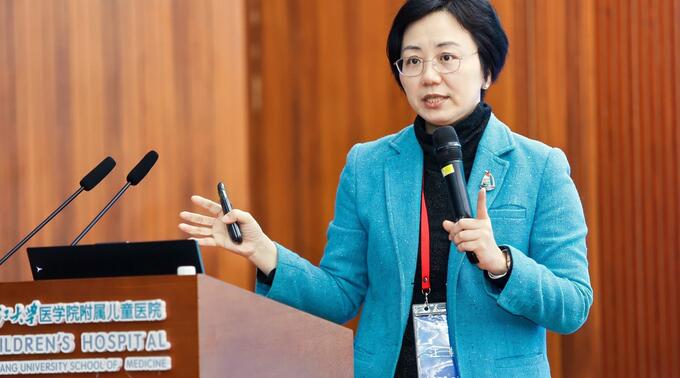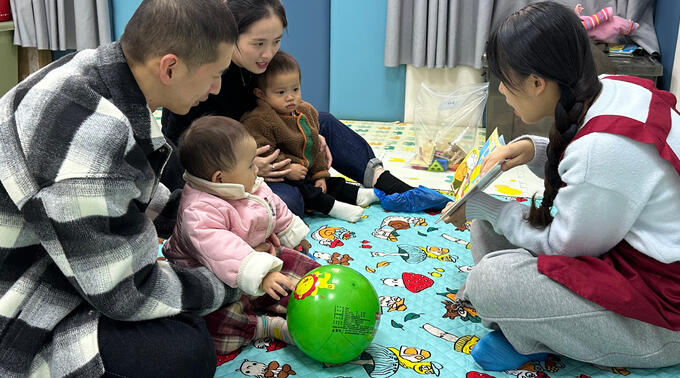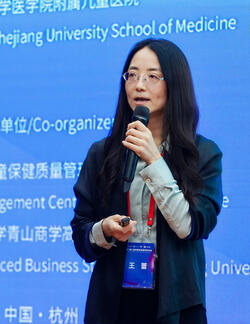REAP Convenes Second International Symposium on Early Childhood Development
REAP Convenes Second International Symposium on Early Childhood Development
"Advancing Development with 'Children First' Strategy", the second International Symposium on Early Childhood Development, was held in Hangzhou, China on March 27-29, 2025. The symposium gathered over 100 experts from China and abroad to discuss cutting-edge developments, research topics, and practical approaches in early childhood development.
The 2nd International Symposium on Early Childhood Development, Advancing Development with "Children First" Strategy, was held in Hangzhou, China, March 27-29, 2025. It was hosted by: the National Clinical Research Center for Child Health; the Zhejiang University School of Medicine's Pediatric Hospital; Stanford University's Rural Education Action Program (REAP); and REAP's partner inside China, the 1000-Day Initiative. The symposium gathered over 100 experts from China and abroad to discuss cutting-edge developments, research topics, and practical approaches in early childhood development (ECD).
At a time when China's National Health Commission and its National Development and Reform Commission are considering upscaling a nationwide ECD program in rural China, the ECD symposium featured keynote speakers Professor Scott Rozelle, director of REAP at Stanford University, Ali Shirazi of UNICEF China, Professor Jiang Fan of Shanghai Jiaotong University's School of Medicine, and Professor Shao Jie of Zhejiang University's School of Medicine. The speakers delivered insights on the importance of ECD in rural communities for both the families themselves, as well as for China's overall economic development. Much of the discussion was focused on evaluating current pilot programs, reviewing research efforts, and developing policy recommendations for upscaling ECD across rural China.

Key Takeaways
- China's national government recognizes a significant challenge in rural communities: the high rate of developmental delays in children. These delays are not primarily due to genetic factors, health, or nutrition, but are largely attributed to a lack of stimulating home environments. Addressing this issue through improved understanding of the importance of engaging ECD at home can make a substantial difference.
- Experts, including academics and top health officials, believe this challenge is solvable. The research of REAP and its collaborators has been seminal in providing the basis for addressing both the problems and the solutions. By training caregivers - primarily mothers and grandmothers - on how to engage with their children through reading, storytelling, and interactive play, children who are mildly or moderately delayed can achieve normal development. However, current programs are thought to be too costly (given shortages of fiscal resources in many regions of China), highlighting the urgent need to develop both effective and affordable strategies for equipping parents to create enriching home environments for ECD. Supporting caregiver training initiatives is critical for addressing the challenges of developmental delays in rural schoolchildren.

The conference highlighted the importance of continued research, collaboration, and innovation to advance ECD and achieve high-quality population development. Both REAP and the 1000-Day Initiative was recognized for its contributions to exploring intervention models and fostering ECD in China.
Experience sharing. Many of the presentations and reports showed that investing in ECD projects is effective. One-on-one intervention models tailored to children and caregivers significantly enhance developmental outcomes. Training caregivers in health, nutrition, and mental health amplifies the impact of these initiatives. By focusing on underserved communities and understanding success factors, the lives of young children and their families can be transformed by ensuring ECD projects reach those in need and deliver meaningful benefits.
Researching cost effectiveness - and effectiveness. While it is known that it is possible to intervene and address the basic ECD challenges in rural China, one of the main goals now of academic and policy officials is to identify interventions that are also cost effective. Shen Yun, a postdoctoral scholar at REAP/Stanford University, is running a group-based training project in Zhejiang Province using a one-on-five approach to enhance early learning. In Hubei Province, Xiao Yuyin, also a REAP/Stanford University postdoctoral scholar, and Yiwei Qian, an associate professor at Southwest University of Finance and Economics (and former postdoctoral scholar at REAP/Stanford University) are principal investigators in an innovative "digital plus" intervention that combines digital technology with short-term (8-12 weeks), traditional one-on-one training methods. A cost-benefit analysis shows that if these interventions enhance cognition, language, and social-emotional skills, costs per child could drop to 30-40% of previous one-on-one training models, maximizing reach and impact. Professor Guan Hongyuan, Capital University School of Medicine, introduced a community-based parenting skills model emphasizing parental involvement in child development. These initiatives are vital in transforming education for young rural children.

Long-term impacts. In the presentation by Professor Wang Lei of Shaanxi Normal University (pictured right), the audience was shown the real importance of ECD training for mothers and grandmothers in fostering large, positive, short- and long-term child outcomes. In the longitudinal study with over 600 infants, about 300 received ECD training while the others did not. The results showed that not only did the treatment group children have significant improvements in cognition and language by age 3, even more outstanding is that the benefits of the 0 to 3 training program become even more pronounced by the ages of 5 and 10 and 11. When the treatment children were in the fifth grade, they also scored notably higher in math, indicating long-term academic advantages. This training encourages families to invest in their children's potential, promoting greater educational engagement. The study's title, "Same Village / Different Destinies," underscores the impact of early interventions on life trajectories. Support for ECD programs can help many children experience transformative benefits and create brighter futures.
Grassroots practices. Maternal and child health professionals from three pilot counties in eastern, central, and western China shared experiences from their ECD projects. Professors Shao Jie, Zhejiang University, and Li Guohong, Shanghai Jiaotong University, emphasized the vital need for high-quality nutrition and healthcare for young children. Their discussions highlight that improving these foundational elements is crucial for better health and developmental outcomes. By focusing on grassroots practices, these professionals aim to implement effective strategies to enhance the well-being of children and families in their communities. The study, presented by Dorien Emmers, an assistant professor at Belgium's KU Leuven University, showed that when 1- to 2-year old children have better health and nutrition, their levels of cognition rise faster in a stimulating home environment when they are 2 to 3 years of age.



